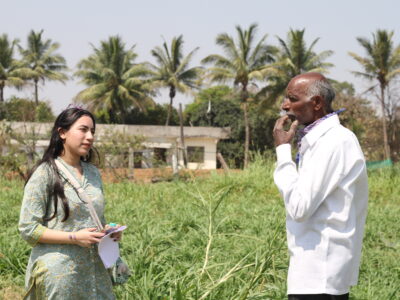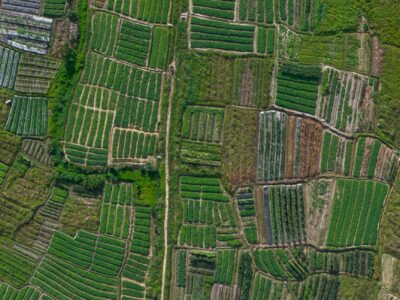At the 2023 Global Public Policy Network Conference (GPPN) in March, five students from Columbia University’s School of International and Public Affairs were selected as finalists for their policy proposal to tackle deforestation in Brazil.
This year’s conference asked participants to address the issue of global political polarization and the challenges to building social cohesion.

What started as a simple conversation on the challenges of ensuring food security and environmental conservation turned into a winning idea for one group of students in the M.P.A. in Environmental Science and Policy program. After hearing about the GPPN competition, the team pooled their international expertise on existing regulations from across the globe, with their individual strengths, to build a robust and extensive plan for effecting change.
Sarah Bryan, João Francisco Adrien Fernandes, Olivia Parker, Matteo Chiadò Piat, and Ezekiel Maben traveled to São Paulo, Brazil, to present their idea to the deans of eight of the most prestigious schools of public affairs across the world. Their strategy, “A National Green Label for Brazil,” was aimed at tracking, labelling, and reducing illegal deforestation in the Brazilian cattle supply chain. While they didn’t win the overall competition, the students advanced to the final round and received the award for “Best Concept.”
The National Green Label system they proposed would enable the Brazilian government to trace and monitor deforestation along the cattle supply chain at the property level. It suggests the integration of multiple existing state and national databases that do not currently work together into a cohesive and publicly accessible, federally managed data center to increase transparency and highlight inconsistencies in the supply chain. The proposal’s ultimate measure of success would depend on how much of the cattle production can be tracked and therefore not connected to illegal deforestation.
The proposal also addresses an international context in which governments like those of the U.K. and E.U. are developing trade barriers for agricultural products related to deforestation. Brazil, along with other countries, would have to show evidence through a due diligence system that their agricultural commodities are not coming from deforested areas. The Green Label proposal avoids the use of private certification, which would create market segregation with a major negative social impact, since only larger and well established farmers could afford private certification schemes. Implementing a public Green Label would mean all farmers could receive the same treatment.
In the future, the Green Label system would offer the possibility for expansion to cover additional agricultural products. In doing so, Brazil would be able to decouple illegal deforestation from its food supply chain, ensuring access to foreign markets. This program could also be adopted by other developing nations, transforming Brazil from a rule-follower into a rule-maker and establishing the country’s role as a leader in global food security while conserving its natural resources.
With the demand for food production accelerating alongside population growth, agriculture could continue to burden Brazil’s biodiversity loss if strategies such as the Green Label are not on the table. Home to almost 60% of the Amazon rainforest, Brazil has the chance to play a key role in safeguarding that critical ecosystem by tackling illegal deforestation and regulating land use change for food production.

The technology to implement this policy already exists, and the students are continuing to engage in stakeholder conversations to back this initiative and to build political support to implement this policy. Most recently, the group submitted their research to the Brazilian Ministry of Environment’s public hearing on the Action Plan for Prevention and Control of Deforestation in the Legal Amazon.
Their experience at the GPPN conference was very rewarding, according to the students. In particular, they were pleased with their ability to synthesize such vast information into a 5-minute presentation, and the number of international perspectives they heard during peer-to-peer interactions. But the dreams of this team are not limited to Brazil. “One thing that excites all of us is the scalability of this proposal,” Parker said. Other agricultural export nations are going to face the same trade restrictions in coming years, so there are many opportunities to learn from and replicate this project.



